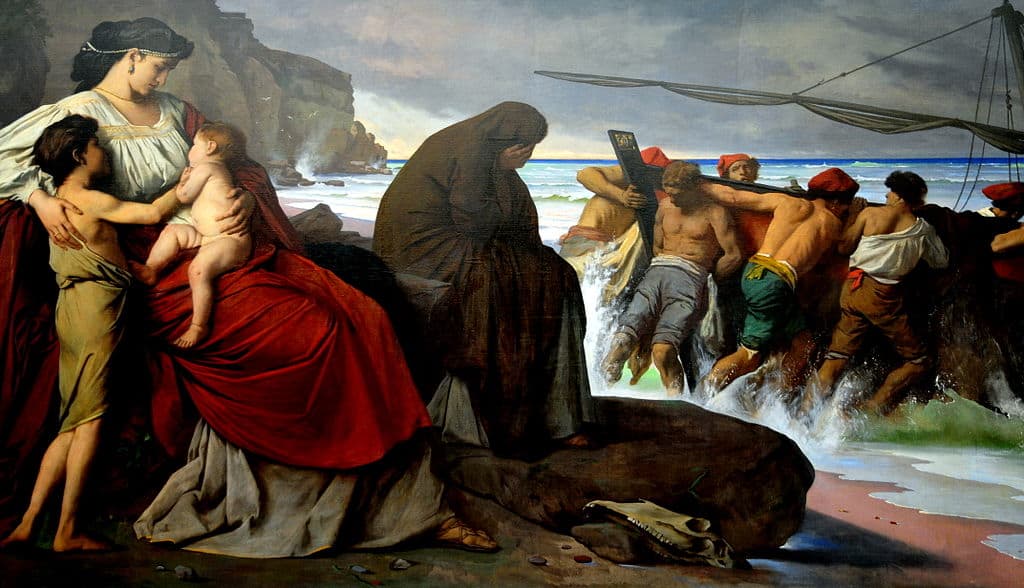One of the goals of The Jesuit Post is to create content that can be used in high school and college classrooms. The “Return to the Classics” series is one way we aim to fulfill that goal. Every year, thousands of students at Jesuit schools read a selection of the classics of Western literary, philosophical, and theological traditions. “Return to the Classics” provides a Jesuit perspective on these works, steeped in Ignatian Spirituality.
A brief plot summary of the Medea, Euripides’ Ancient Greek tragedy, might lead one to question why a Catholic, Jesuit publication would choose to highlight this work. In short, the titular sorceress, dumped by her husband Jason, murders the Princess of Corinth, her ex’s new love interest. She escapes to Athens in a flying chariot, showing off the lifeless corpses of her and Jason’s two children that she slaughtered to exact revenge on her husband.
The play sounds more like a horror fantasy than a timeless classic. However, William Lynch, dubbed by America Media as “the greatest American Jesuit you’ve probably never heard of,” features Medea in his theology. Why? Lynch argues that Medea’s unchecked reaction to a broken promise reveals something essential about faith.
The Medea of mythology is a witch from Colchis, present-day Georgia, with mystic powers granted to her by her grandfather Helios. Yes, Medea is the granddaughter of the sun! Using her supernatural abilities, Medea assists the visiting heroes from Greece to acquire the Golden Fleece, a powerful divine artifact, for Jason. After helping Jason, Medea departs her native land to start a family with him in Corinth.
Indeed, the above terse summary is not an exaggeration of the plot. The important missing details, however, are Jason and Medea’s motivations. Jason allegedly pursues the Princess of Corinth in order to secure a more promising future for he and Medea’s children. To him, the most important thing in life is “to live well and not in poverty” (664-5). Jason even confesses that he does not even “lust for some new bride” (660). In the end, he is unfeeling and pragmatic.
Medea, however, is driven by love and loyalty. She cries, “My love for you [Jason] was greater than my wisdom” (571-2). She does not “want a merely prosperous life, accepting pain or great wealth at the expense of happiness here in my heart” (711-14). Her dedication is rooted in their love together—what they have now—instead of what they could have with wealth.
Ultimately, Medea is crushed by Jason’s infidelity. In response to his plan to marry the princess, Medea wails about her “broken faith” (586). Elsewhere, she highlights the promises Jason made to Medea: to live together in love, to raise their children, and to die together. Medea’s happy memories are now tainted by his heartless pragmatism. Even though Jason promises after their split to provide ongoing support, Medea in the present is now thrust to the margins of society as a foreign divorcee. She is robbed of her future.
The broken promises of life drive Medea to rage uncontrollably, leading to suffering and death for everyone in her wake. We might think that Medea’s actions are unbelievable and that no one would ever kill her own children for revenge. At a minimum, though, we are likely quick to judge Medea as unhinged or impulsive. That is precisely Euripdes’ objective. Rage is costly. The play teaches us that we will encounter suffering and wrongdoing in life, whether intentional or not, but we should and can control how we react.
For William Lynch, Medea’s rage from a broken promise is more than just a moral from a Greek tragedy. It is at the heart of our Christian faith. In his influential work Images of Faith, Lynch writes that faith “comes into force as soon as promises begin to be made to it.” In other words, Lynch argues that faith becomes effective when a promise gives it personal meaning to the individual. Faith requires more than academic concepts. It is an exchange of trust.
Lynch explains the above point using the story of Abraham. When still a stranger to God, Abraham received a promise that he will father the great nation of Israel if he followed and served the Lord our God. Lynch puzzles over God’s command for Abraham to sacrifice his only son. When walking up the mountain to sacrifice Isaac, Lynch imagines that Abraham required analogical thinking in order to reinvent God’s promise of a great nation. Abraham needed to change his image of what a great nation could be since he was seemingly about to kill the only person who could ensure Abraham’s progeny.
Abraham only had two choices in Lynch’s estimation: abandon the promise and hence his faith in God or change his understanding of that promise. If Abraham had not adjusted his thinking, Lynch posits that Abraham could have become enraged like Medea. After all, Abraham abandoned his hometown and traversed the imperiled desert at the direction of this God who only made Himself known precisely through that promise. This promise exerts so much influence over his life trajectory that he would be left with the painful work of piecing his life together without it.
Our lived experiences might be closer to Abraham and Medea than we might think. For example, many people abandoned their careers during the pandemic, now known as the “Great Resignation,” because they found themselves so far away from the dreams they had promised themselves to pursue when they were younger. Or how many people cut off ties with a friend or family member who backstabbed them or violated their trust?
We also hold scores of promises in our faith life. When we are young, we hear that God loves us unconditionally. Every Good Friday, we commemorate that Jesus died for our sins. On Easter, we remember Jesus’ resurrection, trusting that we too will share in that same promise of eternal life with God. In the sacrament of confirmation, we are sealed with the gifts of the Holy Spirit.
Whatever promises we feel have been spoken to us, Lynch suggests that we must be prepared to adapt them. Or else, when we suffer disappointment we will feel just as betrayed as Medea. For instance, suppose a woman named Caroline, a naturally talented artist, trusts that God has communicated a promise to her akin to Jeremiah’s: “For I know well the plans I have in mind for you—oracle of the Lord—plans for your welfare and not for woe, so as to give you a future of hope” (Jeremiah 29:11). Caroline understands that God has given her incredible skill for a reason. She goes to art school and builds a tight-knit friend group of lifelong friends. In the end, she dreams of using her art to inspire faith in youth.
What will Caroline do when, after years of success and God’s promises seemingly fulfilled, the only job offered to her is corporate design work? Will Caroline think her faith was always mistaken? Would she view her teaching Sunday school class consolation prize? Imagine if Caroline instead shares in the workplace her faith that God is the source and inspiration of her work. Perhaps a few of her workers become interested in returning to church. This is not Caroline’s original image of her promise. But it is how God is fulfilling that promise. Her choices are either dismissing her faith as childish naivete, likely to be accompanied by some pain, or changing her understanding to see what God is actually doing in her life.
As the Medea teaches us, however, some broken promises are too painful or heinous to be merely adapted. We may simply abandon the promise, even though that entails anger or sadness. Enraged by the clerical sex abuse crisis, droves understandably left (and continue to leave) the church. Clergy promise to care for the most vulnerable, and we are rightly irate when that trust is violated. Many queer Christians leave their churches significantly hurt as they feel faith is used to entrap them in homophobia instead of helping them understand how they are made in God’s image and likeness. Often, their family and friends go with them.
An important extrapolation of Lynch’s concept of the promises of faith can be used to understand those who leave the church silently. I guarantee we know many of them. They are our siblings, friends, high school classmates, and coworkers. One day, without any apparent conflict, they just decide Catholicism is no longer for them. I suspect it’s because these promises of faith were never spoken to them in a language that they could understand. Or, they could not adjust their understanding of those promises when faced with a challenge. They just go without rage because those promises were never received in the first place.
We must find some way to make biblical stories of liberation, sacrifice, and new life mean something to others. The secret of evangelization is communicating the promises of faith to another in a meaningful way for them. Often, the best way to do so is through personal witness. Accordingly, it might be helpful to reflect on the following questions. What is my own personal Exodus? What are the restful waters to which the Lord has led me? What is the cross that I carry—and why do I carry it? How does the promise of heaven influence how I live my life today?
Of course, communicating these promises carries risk. The Medea reveals the power of a promise. When they are broken and our world collapses, we are faced with two choices: change our understanding of that promise or bring the world down with us. Nevertheless, Jesus commissions Christians to safeguard and share God’s promises to us. These promises initiate the spiritual journey and fill it with life.
Author’s Note: This article is indebted to my phenomenal instructors who have helped this economist appreciate the classics, understand philosophy, and make meaningful connections to theology. Thank you to Fr. Michael Zampelli, SJ for introducing me to the Medea and the wonderful world of Ancient Athens. An immense debt of gratitude to Fr. Steve Schloesser, SJ, whose classes and campus lectures helped make the late William Lynch, SJ a personal friend on my own spiritual journey.


